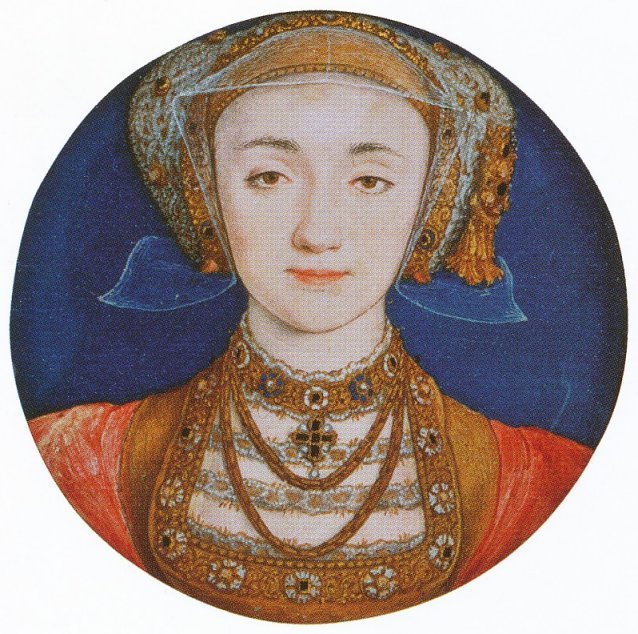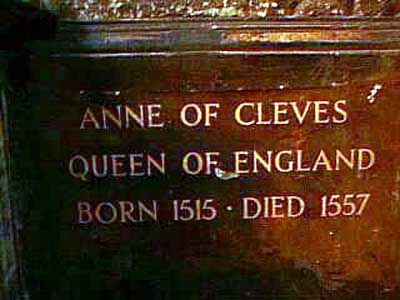Was Anne of Cleves Henry VIII's most successful queen?
- Dec 28, 2020
- 7 min read
On December 27th 1539, Princess Anna von Jülich-Kleve-Berg, more commonly known as Anne of Cleves arrived at Deal in Kent in preparation for her marriage to King Henry VIII. Two years earlier, the Kings third wife Jane Seymour had died within a fortnight of giving birth to Henry's longed for male heir, Prince Edward. The marriage between Henry and Anne was primarily brought about by the machinations of Henry's chief minister, Thomas Cromwell. Henry needed European allies - his two greatest rivals, King Francis I of France and the Holy Roman Emperor Charles V had forged a treaty, and his troubles were further compounded by Pope Paul III reissuing the bull of excommunication against him. Like Henry, Anne's brother the Duke of Cleves had expelled papal authority from his country. For Cromwell this made a union with Cleve's all the more attractive as it would provide a major boost to the English reformation for which he was so heavily invested in. It was for this reason that he championed the union between Henry and Anne with so much enthusiasm.
In March 1539, Henry finally relented and allowed Cromwell to begin the negotiations which would broker the marriage. He sent his court painter Hans Holbein to Cleves to paint Anne, providing him with a clear image of the woman he would potentially marry. Henry specifically instructed Holbein to not flatter or in anyway enhance the portrait - he wanted to see a true likeness. When Henry was presented with Holbein's image of Anne, the King was said to be delighted with the result, the image can be seen below. She appeared to have a pretty face, with small brown eyes, delicate lips and pale skin. Henry agreed to the match and a treaty confirming it was signed on October 4th 1539. Anne would set sail for England just a few weeks later.
On New Years eve 1539, Anne arrived at Rochester Castle in Kent. The following day, Henry dashed to meet her and in true chivalric tradition, went in disguise. Unfortunately, Anne was unaccustomed to this most English code of conduct, and did not react in the way the King expected. She rebuffed his advances, with no outward display of enthusiasm or reverence, instead treating the King with little interest. Her English was at this time highly limited, so this coupled with her ignorance of the man whom she had greeted did nothing to endear her to the King. Perhaps the unsuccessful nature of this first meeting made it clear to the King that Anne of Cleves was not the woman for him, but what is beyond doubt is that he was immediately put off her. After the meeting he was heard screaming at Cromwell "I like her not! I like her not!". Whilst it is unlikely that Anne of Cleves was as ugly as history is told us, it is clear that she was somewhat unlike Henry's three former queens, being tall and broad. Her nose was also large and had been successfully disguised by the clever painting techniques of Hans Holbein. It is said that the pale skin seen in the portrait had also been flattered, as she bore the scars and marks of having suffered with smallpox. I feel it prudent to state here that Anne has been delivered of a great injustice by history. Contemporaries at the time were flattering of her, and yes she may not have been a great beauty, but it's a long way from being average in looks to being downright plain. It should also be pointed out that the King was no catch either. He was grossly overweight by this time and the ulcer in his leg that incapacitated him was said to smell appalling.
Unfortunately for the King, there was no going back. He had signed the agreement with the Duke of Cleves, and was honour bound to move ahead with the marriage. That isn't to suggest he didn't try. On several occasions the King summoned his ministers and attempted to find a loophole out of the marriage, but there were none to speak of. It is said he told Cromwell furiously "is there none other remedy but that I must needs against my will put my neck in the yoke". On January 6th 1540, the marriage went ahead as planned. Knowing his duty, Henry understood that he needed t consummate the marriage, but would tell Cromwell the following day that she repelled him, and that he had been unable to go ahead with sleeping with his new queen. He complained of "evil smells about her" and commenting on the "looseness of her breast", which was seen in 16th century England to be a sign that a woman was not a virgin. He was report to one of his servants that her appearance did little to excite him and thus he "left her a good a maid as I found her" - in other words, he couldn't get it up. As an exceedingly proud man, it appears to me far more likely that he was now so unhealthy that his inability to consummate the marriage was an issue of his own, but that wouldn't do any good for his reputation. For Henry, all the blame sat squarely with Anne. Henry and Anne can be seen below.
Beyond her looks, Anne appeared to also lack the charm and charisma that Henry so valued in his queen consorts. She had not been educated in the English or French fashion, where subjects such as language, dancing, music and skills in good conversation took precedence. She was instead taught needlework and how to manage the home. This lack of courtly refinement made Anne stand out for all the wrong reasons and soon it became clear to the King that she had to go. Cromwell had been arrested, but even from his prison cell was obliged to provide evidence which would allow Henry to separate from Anne. On June 24th, Anne was ordered to move her court to Richmond Palace and soon after discovered that her marriage was under investigation because of her previous betrothal to the Francis, Duke of Lorraine. Upon being asked by a group of councillors to co-operate and agree to an annulment, she initially refused, but on reflection and perhaps thinking of her namesake, Anne Boleyn, she took the pragmatic approach and agreed to Henry's terms.
After just six months of marriage, Henry and Anne's marriage was formally annulled on July 9th. Anne's acquiescence resulted in her being richly rewarded. Henry provided her with Hever Castle, Richmond Palace and Bletchingley Palace plus a large annual income. Henry agreed that she could keep all royal jewels, goods, furs and goldware. Above all, Henry exalted her status to be recognised as his "sister", providing her with both royal rank and considerable position within the Kingdom. Beyond his daughters and future queen consorts, Anne would be the most senior woman in England.
Anne would spend the rest of her life as a fringe member of the English court. She maintained a cordial relationship with Henry VIII, who personally visited her at Hever Castle, her primary residence on several occasions. It is said that she lived at Hever like a queen, without any of the pressure that came with actually taking on that role! Unfortunately, her status was greatly reduced when King Henry died. The new King Edward VI viewed Anne as nothing more than a drain on his resources, and felt she had no true purpose within the English court. His councillors removed two of Anne's manors, but determined to not wallow in self pity she transformed Hever Castle in to her own "mini" court away from London. Hever became her central base, using it to host parties, meet diplomats and greet guests. Her stepdaughter Princess Elizabeth was said to be a regular guest to the castle.
Anne maintained a strong relationship with both of Henry's daughters, and when in 1553, Princess Mary was crowned Queen Mary I, Anne was accorded a place of honour within the proceedings. She travelled to the coronation in an open carriage alongside Princess Elizabeth. They stood directly behind Mary as she processed in to Westminster Abbey, again highlighting her senior rank within the kingdom. Anne and Elizabeth's religious leanings were in direct contrast to the dogmatic Catholicism of their new queen, and soon rumours began to swirl that they planned to overthrow her. The rumours did not come to much, and Mary agreed to not proceed against her step-mother and sister. Despite this, Anne once again displaying an incredible knack for sense and discretion soon left the court and lived out the remainder of her days in Hever.
On the 16th July 1557, Anne died at the age of 41 after a short illness, most probably a cancer of some description. She outlived Henry's last queen Katherine Parr by nine years, and was granted a full royal funeral by Queen Mary with all the ceremony and reverence one
could expect from such an occasion. She was buried in Westminster Abbey, where her remains are still housed to this day. A small stone slab marks out her resting place on the south side of the High Alter.
Despite her short-lived marriage to the King, Anne maintained strong relationships with practically everyone in the English court, and has been outlined above developed a strong bond with both her stepdaughters. Her willingness to comply with the wishes of the King may not be viewed as an act of defiant feminist strength, but undoubtedly ensured her a happy retirement and lavish life for the remainder of her days. She has gone down in history as the "ugly one", the "Flanders mare", and yet ultimately she had the last laugh. Just six months of marriage, and she would go on to have an independent, luxurious and happy life, something incredibly rare for a noblewoman in 16th century England.
Her mark on history is of course less consequential than Henry's first three queens, but for me there is no doubt that she has the right to be known as "his most successful wife". She played the game, she understood her part, and she rolled a winning hand.
Written by Adam Pennington
28th December 2020.












I know it's been a few years so maybe you know this now, but if not I'll tell you here. Anna of Cleves was pretty.
When she ignored him at their first meeting in front of everyone, it was a huge blow to Henry's pride. So there was a woman in the world who didn't immediately fall in love with him? That made him "like her not" and his reasons for an annulment were her pre-contract that hadn't been in effect for four years and his claim the marriage wasn't consummated (it was) because she was ugly. His claims about her looks can all be applied to Henry--that may be how he got the ideas. For instance, he smelled "evil"…